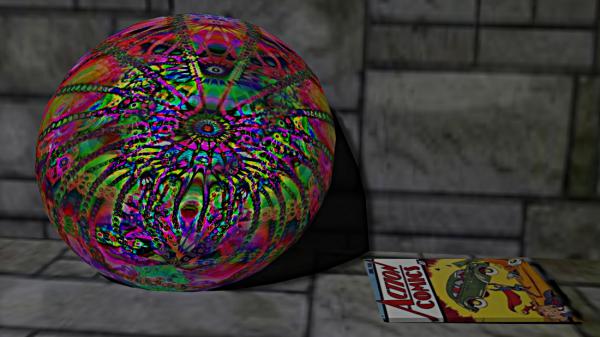BY LETTER
Non-fungible Goods and Services in Post-scarcity Societies
Culture and Society > Daily Life
Culture and Society > Economics
Culture and Society > Cultural Factors > Socio-Ecological Categories
Culture and Society > Economics
Culture and Society > Cultural Factors > Socio-Ecological Categories
 Image from Steve Bowers | |
| Non-fungible goods include rare, original, irreplaceable items such as this ancient sacred Earth text and Auld Limner demon-painting | |
Technically speaking no post-scarcity economy has truly eliminated scarcity (rather the term comes from the transition to economics of abundance). Correspondingly there will always be certain commodities that are scarce, even if copies can be mass produced. Examples of these non-fungible goods and services are original pieces of artwork, specific areas of land and services from a particular individual or group. Scarcity economic principles still apply but generally the demand for non-fungible commodities is still so low that most individuals are excluded from the economy. Systems of dealing with this (outside of individual gifting) differ but most systems account for this in some way. Below are a few common methods.
Private Markets
As with scarcity economics private markets can be used to trade unique items or services. Currency can be fiat or not (depending on local custom). Most sophonts rarely have a need to interact in a private market as social infrastructure can provide for nearly all needs; exceptions include specific living space, art, branded goods and live entertainment. It is often difficult for sophonts to enter a market if they do not already own something unique or are capable of a desirable service. There are various solutions to this varying by local custom; two prominent examples are to seek a private loan or to make use of publicly available education and augmentation to create something able to be sold on a market. A third and common option is rapid barter (see below).Common Ownership and Rentism
Various goods such as original artworks or plots of land may be held in common ownership. As such it is not possible for them to be traded between individuals (at least without true ownership still residing with society at large). Because of this it is quite common for a form of rent to be employed with individuals paying with whatever resources their economic system allows (e.g. a portion of their socially provided allocation of credits). Rent may be conditional with set durations which are determined legally but can also operate on a bid system with the citizen bidding the most currency/time gaining stewardship. Alternatively or additionally an individual may have to meet certain criteria before they are eligible to rent.Common Ownership and Lottery
Non-fungible goods are held in common ownership but they can be allocated to individuals for a set time in a lottery system. Usually sophonts put their name in for a specific commodity and a periodic lottery determines who gets it as well as what conditions come with the allocation. Once the time is up the sophont loses ownership rights and has to apply again.Net-assisted Barter
Under this system individuals can use expert systems and sites on the Net to seek out owners of non-fungible goods and services and enter negotiations for a trade. This system is particularly popular with exotic-artefact merchants who frequently trade and acquire for an extensive collection. Whilst it is often difficult for individuals with nothing to trade to enter the market, once they possess something unique or offer a service they can quickly find themselves trading up the ladder, accumulating a wealth of artefacts, land and favours. Whilst it is possible to do this for oneself various intelligent services exist. A prominent example is a mercantile expert system. Given a goal and an initial portfolio, this intelligent form of trading sophtware will ruthlessly trade until the desired item is acquired. The expert system does this by attempting to spot chains of "coincidence of wants" (e.g. by swapping a painting for a map, a map for a ring, a ring for a promise of service and a promise of service for the goal item) as well as attempting to acquire items that boost the portfolio's value.An example of this would be to give the mercantile expert system the goal of acquiring any original work by a specific artist; the expert system may then keep track of all available artefacts as well as the items that the owners of these artefacts are seeking. In a complex series of rapid trades the expert system can engage in countless transactions before finally completing its quest. The amount of time this takes can greatly vary, sometimes sophonts are lucky and find that their mercantile expert system has managed to trade its way to acquiring the desired artefact seconds after being set the task. On the other hand in the Current Era there are still expert systems that have been pursuing their task since the first autotopias of the Interplanetary Age.
Related Articles
- Digital Money
- Economics in Transapient Societies
- Free Goods - Text by M. Alan Kazlev
A good in unlimited supply at zero price; this applies to many basic consumables in nanotech industrialized systems. - Post-scarcity
- Post-scarcity Economies: Characteristics and Considerations
- Postcapitalism - Text by M. Alan Kazlev
Hyperturing-regulated high abundance nanotech economies which do not require money or other units of exchange. - Systems of Resource Allocation
- Virtual Robots (Vots)
- Wealth and Status in the Terragen Sphere
Appears in Topics
Development Notes
Text by Ryan B (Rynn)
Initially published on 26 May 2014.
Initially published on 26 May 2014.






